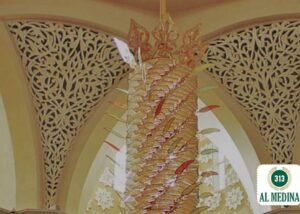Are we permitted to celebrate the Mawlid?
Quran
Hadith
Islamic Text
Yes, it is permitted to celebrate the Mawlid. Many leading classical scholars wrote Fataawa regarding the Mawlid and agreed regarding its permissibility. However, one must stick to practices found within the Sunnah when celebrating the Mawlid.
وَسُئِلَ عَنْ صَوْمِ يَوْمِ الِاثْنَيْنِ؟ قَالَ: ذَاكَ يَوْمٌ وُلِدْتُ فِيهِ، وَيَوْمٌ بُعِثْتُ – أَوْ أُنْزِلَ عَلَيَّ فِيهِ
Abu Qatadah (May Allah Most High be pleased with him) reported that the Messenger of Allah ﷺ was asked about fasting on Mondays. He ﷺ said, “That is the day on which I was born and the day on which I received revelation.” (Sahih Muslim, 1162 – 197).
Is it permitted to celebrate the Mawlid? This seems to be an annual discussion amongst Muslims. Every year around the month of Rabi al-Awal people start to discuss the issue of Mawlid. Such discussions may be beneficial if they involve people with an open mind and an evidence-based approach. Unfortunately, this is not always the case. Many people are not interested in the evidence or opinions of the classical scholars, rather they want to promote the view of the group they associate with. As a result, they will label and insult those who disagree. This is an obvious error and engagement with such people only serves to perpetuate misguidance. However, many people are open to an analysis of the issue in an unbiased manner and want to know what the classical scholars of Islam said about it. This answer seeks to address such people.
Firstly, it is important to recognise that every act of Ibadah (worship) must be found in the Sunnah of the Holy Prophet ﷺ. It is not permitted to invent a new act of Ibadah, doing so will be prohibited since it is a reprehensible innovation (Bid’ah). Therefore, Mawlid can only be permissible if it incorporates acts of worship or piety that have a precedent in the Sunnah. The average Mawlid tends to include singing the praise of Allah (Most High) and His Messenger ﷺ, as well as speeches on the same subject. Often people eat together at the end of the Mawlid. All of this can be easily traced back to the Sunnah, therefore it is permitted.
Some people acknowledge the above but (correctly) raise the issue of the concept of celebrating the birth of the Prophet ﷺ with additional Ibadah. This is a valid concern. They say, even if everything practiced is established in the Sunnah, it is still not acceptable since the Sunnah does not permit additional worship in the context of celebrating the noble birth of the Prophet ﷺ. This is a valid objection and must be addressed, since linking additional worship to a time or situation without evidence can easily fall into the category of a reprehensible innovation (Bid’ah). Which is why classical scholars objected to promoting extra worship on particular nights of the year without evidence.
However, the Hadith above alleviates this concern. Since it is clear in the Hadith that the Holy Prophet ﷺ himself linked additional worship to His ﷺ noble birth. Therefore, we have a precedent for it. Now, some will argue that the Hadith permits fasting alone and nothing else is permitted. It must be acknowledged that fasting is the most superior act of worship when it comes to celebrating the Mawlid, since the direct Sunnah is always superior. But the Hadith cannot be used to restrict Mawlid celebrations to fasting alone. Rather the Hadith serves as evidence to increase worship in the context of Mawlid.
وَقَدْ سُئِلَ شَيْخُ الْإِسْلَامِ حَافِظُ الْعَصْرِ أبو الفضل ابن حجر عَنْ عَمَلِ الْمَوْلِدِ، فَأَجَابَ بِمَا نَصُّهُ: أَصْلُ عَمَلِ الْمَوْلِدِ بِدْعَةٌ لَمْ تُنْقَلْ عَنْ أَحَدٍ مِنَ السَّلَفِ الصَّالِحِ مِنَ الْقُرُونِ الثَّلَاثَةِ، وَلَكِنَّهَا مَعَ ذَلِكَ قَدِ اشْتَمَلَتْ عَلَى مَحَاسِنَ وَضِدِّهَا، فَمَنْ تَحَرَّى فِي عَمَلِهَا الْمَحَاسِنَ وَتَجَنَّبَ ضِدَّهَا كَانَ بِدْعَةً حَسَنَةً وَإِلَّا فَلَا
قَالَ: وَقَدْ ظَهَرَ لِي تَخْرِيجُهَا عَلَى أَصْلٍ ثَابِتٍ وَهُوَ مَا ثَبَتَ فِي الصَّحِيحَيْنِ مِنْ «أَنَّ النَّبِيَّ صَلَّى اللَّهُ عَلَيْهِ وَسَلَّمَ قَدِمَ الْمَدِينَةَ فَوَجَدَ الْيَهُودَ يَصُومُونَ يَوْمَ عَاشُورَاءَ، فَسَأَلَهُمْ فَقَالُوا: هُوَ يَوْمٌ أَغْرَقَ اللَّهُ فِيهِ فرعون وَنَجَّى مُوسَى فَنَحْنُ نَصُومُهُ شُكْرًا لِلَّهِ تَعَالَى» ، فَيُسْتَفَادُ مِنْهُ فِعْلُ الشُّكْرِ لِلَّهِ عَلَى مَا مَنَّ بِهِ فِي يَوْمٍ مُعَيَّنٍ مِنْ إِسْدَاءِ نِعْمَةٍ أَوْ دَفْعِ نِقْمَةٍ، وَيُعَادُ ذَلِكَ فِي نَظِيرِ ذَلِكَ الْيَوْمِ مِنْ كُلِّ سَنَةٍ، وَالشُّكْرُ لِلَّهِ يَحْصُلُ بِأَنْوَاعِ الْعِبَادَةِ كَالسُّجُودِ وَالصِّيَامِ وَالصَّدَقَةِ وَالتِّلَاوَةِ، وَأَيُّ نِعْمَةٍ أَعْظَمُ مِنَ النِّعْمَةِ بِبُرُوزِ هَذَا النَّبِيِّ نَبِيِّ الرَّحْمَةِ فِي ذَلِكَ الْيَوْمِ؟
Indeed Shaykh al-Islaam al-Hafidh Abu al-Fadl Ibn Hajr was asked about the Mawlid. And he replied, ‘Celebrating the Mawlid, in essence, is an innovation. It was not narrated from any of the righteous early Muslims of the first three generations. Nevertheless it includes both good things and their opposite. If one seeks out the good things in celebrating it and avoids the opposite, then it is a good innovation, otherwise it is not.
It seems to me that it may be based on a sound narration, which has been established in the Saheehayn, that when the Prophet ﷺ came to Madinah, he found the Jews fasting on the day of Ashoora. He ﷺ asked them about it and they said, it is the day on which Allah (Most High) drowned Pharaoh and saved Musa , so we fast it in gratitude to Allah (Most High). We learn from this that showing gratitude to Allah (Most High) for a favour that He (Most High) granted on a specific day, bestowing a blessing or warding off harm, and that may be done on the same day every year.
Gratitude to Allah (Most High) may be shown by performing various kinds of acts of worship, such as prostration, fasting, giving charity, and reading Qur’an. Which blessing can be greater than the birth of this Prophet ﷺ, the Prophet of Mercy, on that day?’ (Imam al-Sayooti, al-Haawi li al-Fatawi).
In the Nass (text) above Imam al-Sayooti quotes the Fatwa of Imam Ibn Hajr al-Asqalani on the issue of whether one can celebrate the Mawlid. This is representative of the views of classical scholars. Whilst recognising that the Mawlid in its current form was not practiced in the time of the Holy Prophet ﷺ, they accepted it since it is broadly in line with the Sunnah, such that the acts within it can be traced back to Sunnah.
وَكَانَ يَعْمَلُ الْمَوْلِدَ الشَّرِيفَ فِي رَبِيعٍ الْأَوَّلِ، وَيَحْتَفِلُ بِهِ احْتِفَالًا هَائِلًا. وَكَانَ مَعَ ذَلِكَ شَهْمًا شُجَاعًا بَطَلًا عَاقِلًا عَالِمًا عَادِلًا – رَحِمَهُ اللَّهُ تَعَالَى. وَقَدْ صَنَّفَ الشَّيْخُ أَبُو الْخَطَّابِ بْنُ دِحْيَةَ لَهُ مُجَلَّدًا فِي الْمَوْلِدِ النَّبَوِيِّ سَمَّاهُ ” التَّنْوِيرَ فِي مَوْلِدِ السِّرَاجِ الْمُنِيرِ ” فَأَجَازَهُ عَلَى ذَلِكَ بِأَلْفِ دِينَارٍ (البداية والنهاية – الْمَلِكُ الْمُظَفَّرُ أبو سعيد كوكبرى)
And he used to host the noble Mawlid in Rabi al-Awwal, and he would celebrate it with a great celebration. He was generous, courageous, brave, intelligent, scholarly, and just, may Allah (Most High) have mercy upon him. Shaykh Abu al-Khattaab bin Dihyah wrote a single volume book for him regarding the Mawlid of the Prophet ﷺ called, ‘al-Tanweer fi Mawlid al-Siraaj al-Muneer.’ So he rewarded him with a thousand Dinaars. (Imam Ibn Katheer, al-Bidayah wa al-Nihaayah).
In the Nass (text) above we find Imam Ibn Katheer mentioned the Mawlid in the biography of al-Mudhaffar Abu Sa’eed al-Kowkbari, whilst praising him for his good works and qualities. Imam al-Dhahabi done the same in his Siyar. So it seems that the Mawlid had such widespread acceptance amongst classical scholars that they mentioned it in passing.
It is correct to say that some classical scholars spoke against the Mawlid celebration, for example Imam Ibn al-Haaj. However, when one reviews the texts of such scholars, it is clear to see that they did not object to the Mawlid itself, but rather to certain practices introduced by ignorant people. See the link below for a more detailed discussion on the issue.
For anyone who researches the issue of Mawlid it is clear to see that classical scholars deemed the Mawlid to be permissible. As Sunni Muslims we give preference to the understanding of classical scholars over recent or contemporary scholars.
And Allah (Most High) Knows Best.
– Answered by Shaykh Noorud-deen Rashid (03.10.2021)
See also:
Did some classical scholars disagree with the Mawlid?
See also (video):





